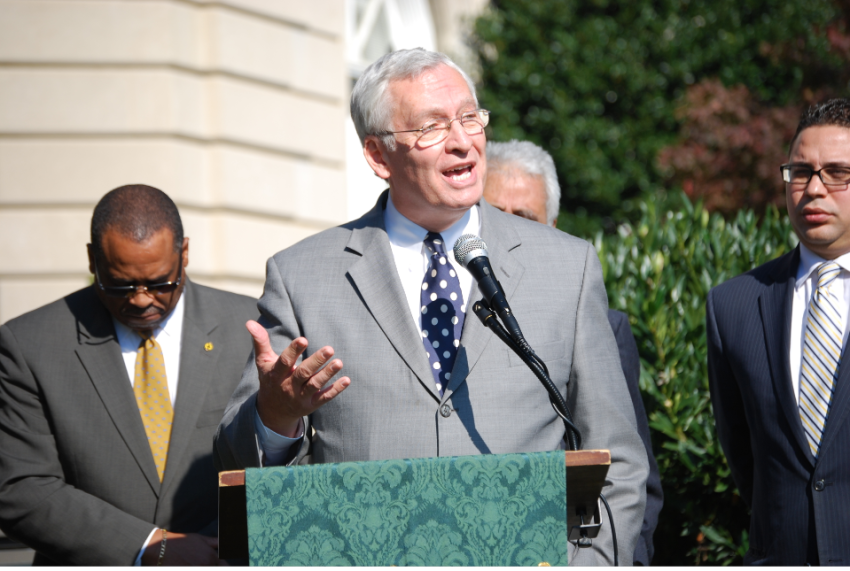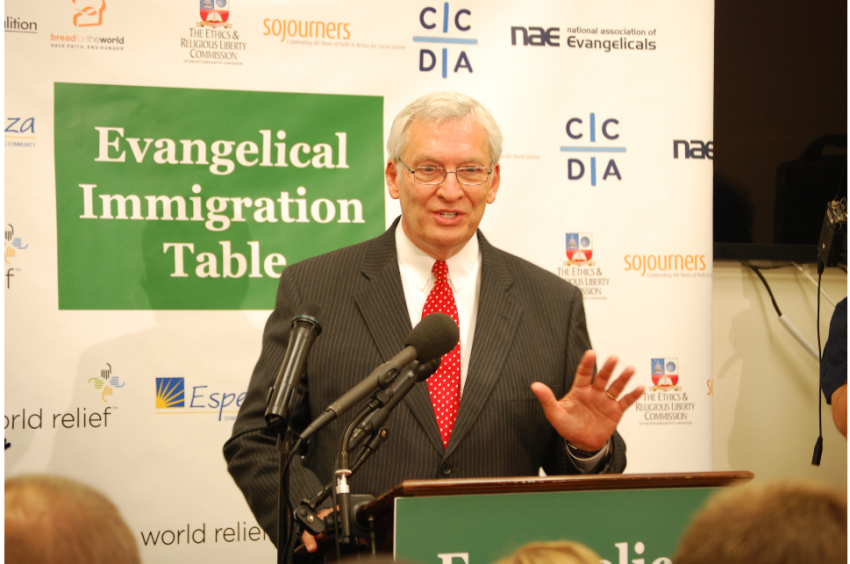Retiring NAE pres. details ‘changing face of evangelicalism,’ how mov't is evolving

The retiring president of the National Association of Evangelicals, Leith Anderson, says he's stepping down at a time in which evangelicalism is in the “midst of a really good day,” thanks to the incredible growth brought to the movement by immigrants.
Anderson says he's planning to step down as soon as a search committee find his replacement to lead the association of over 40 denominations and 45,000 churches. And the 74-year-old former Minnesota megachurch pastor said he's happy to report that there's a “changing face of evangelicalism” in the United States.
At a time in which there are prevailing media narratives about evangelicals that link the movement to some sort of pro-Trump Christian nationalism, Anderson says that narrative doesn’t represent reality.
“It is increasingly a face of immigrants, particularly from Latin America and parts of Asia,” Anderson told The Christian Post in a phone interview, adding that they are immigrants coming from places in the world that are witnessing the greatest growth in evangelism.
“They are bringing a dynamic faith to this country that is changing the face of evangelicalism,” he added. “It is significant and sometimes amazing.”
The growth of evangelicalism has been a post-World War II phenomenon that continues to this day, according to Anderson. However, the way the movement is growing now is a bit different from decades ago.
According to Anderson, the world is experiencing a tremendous growth in evangelicalism in Latin America, Asia and Africa. He added that most of NAE’s 40 member denominations have more people living outside of the U.S. than in it.
But as immigrants migrate to the U.S. from the areas throughout the world where evangelicalism is experiencing explosive growth, they are starting to launch their own churches.
“The things that I see happening are the positive influence of immigrant churches and families in evangelicalism and the starting of new churches,” Anderson said. “I get to travel a lot. When I am in a rental car, I like to get off the interstate and just go through towns and see America. I will stop at a nonfranchise restaurant and just talk to people. Virtually everywhere I go, there is a new church, there is a new church in a school, there is a new church in a storefront, there is a new church sign somewhere.”
“If you go back 25 years, that just wasn’t true,” Anderson continued. “Most of those churches are evangelical churches. Those are seeds that are being planted. They won’t all survive but there are a lot of seeds that are out there that are going to have massive influence into the future.”
To better reflect the changing face of evangelicalism, leadership within the NAE has adapted to become more diverse.
“The history of the NAE, if you go back 75 years, was less diverse in terms of ethnicity, race and gender,” Anderson, who has been NAE president since 2006, told CP. “That has been a high priority to better reflect evangelicalism in America. We have made good progress but we are not there yet.”

The Public Religion Research Institute found in polling last year that most white evangelicals say that America’s increasing racial diversity and immigrants harm America or threaten its values.
“That is not the people I talk to. The people I talk to are thrilled when anybody from anywhere comes to faith in Jesus Christ and are delighted to bring the immigrant Christians, the diversity, the new churches into their association,” Anderson said in response to the PRRI poll. “They are actually thrilled.”
A number of evangelicals have spoken out about what they have seen emerge as a common public misconception that people have about evangelicals.
Considering that exit polls show that 81 percent of white evangelicals voted for Donald Trump in the 2016 presidential election, the term evangelical has taken on a more political connotation that is linked to social conservatism. In reality, the terms “evangelical” and “evangelicalism” are theological in meaning, not political.
While some conservative evangelical leaders have taken to the media to voice their opinions as if they are speaking on behalf of all evangelicals, Anderson believes that evangelicalism is too broad of a movement to be defined by a group of evangelicals’ political opinions.
In 2015, NAE and LifeWay Research partnered to come up with a set of four basic theological beliefs that define what it means to be evangelical.
“Evangelicals are defined by our belief in the Bible, Jesus, salvation, outreach,” Anderson contended. “There are many millions around the world, many of whom wouldn’t even be familiar with U.S. politics. It’s interesting and challenging to be identified by something that is not central to who we are.”
Part of the reason that there might be a political narrative about evangelicals in the common culture is due to the types of evangelicals who make themselves available to the media and those who don’t, Anderson opined.
He recalled an off-the-record conversation he once had with a reporter who told him that there was “easy access” to interviewees willing to express extreme positions. However, the journalist said he had a hard time getting evangelical leaders who will express more moderate positions to do so on the record.
“I thought about that for a long time and wondered why that is,” Anderson recalled.
“I think part of the answer is … most of the leaders I know and work with are focused on what they do. They are concerned about drilling wells for people that don’t have clean water in Africa. They are concerned about starting new churches in the United States. They are concerned about refugees and the poor and the vulnerable and evangelism. That is where they want to focus. They don’t want either themselves or their organizations to be identified in terms of public statements that they are going to make on political or other issues.”
Anderson said that he could empathize with such a reason but understands how unwillingness by moderate leaders to speak their views in the media could lead to “a skewed view of what evangelicals are doing.”
“Evangelicalism is a movement. It is not a centralized location or hierarchy, which gives individuals who want to self-identify the ability to speak as if they are speaking on behalf of all evangelicals,” Anderson said. “That is just not true. It is too many people and it is too broad.”
“We needed to let people understand that there may be some who identify as evangelicals who have various different opinions and they certainly have the right to express themselves but not to project them on all evangelicals, because it is just not true,” Anderson added. “It is a desire to keep to the core of who we actually are.”
Anderson said that he plans to stay on as president until the end of 2019 or however long it takes for a search committee to find his replacement. Anderson is mulling over going into international ministry following his retirement. Anderson also served for 35 years as the senior pastor of Wooddale Church, a megachurch in Eden Prairie, Minnesota.
Following his recent retirement announcement, a number of evangelical leaders from both sides of the political aisle voiced their appreciation for the work that Anderson has done.
“Leith’s years of service to the NAE, have not only strengthened the organization, but they have contributed invaluably to evangelicalism at a time in history when our community has grown to become at least the third largest segment of Christianity in the globe, and maybe soon, the second,” Johnnie Moore, an author and a prominent evangelical communications executive, told CP in a statement.
“Leith is probably too humble to ever acknowledge it, but many of us recognize clearly that God himself entrusted to his servant leadership a critical moment in 2000 years of Christian history in a nation that has played an indispensable role in the advance of God’s mission.”
Follow Samuel Smith on Twitter: @IamSamSmith
or Facebook: SamuelSmithCP



























